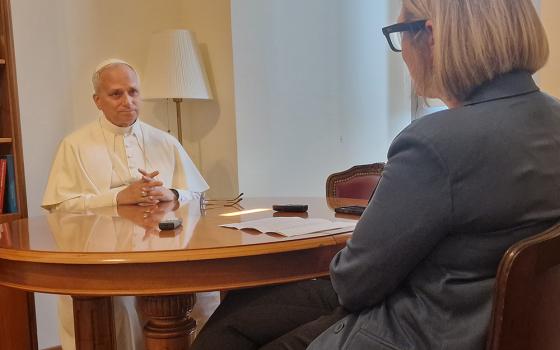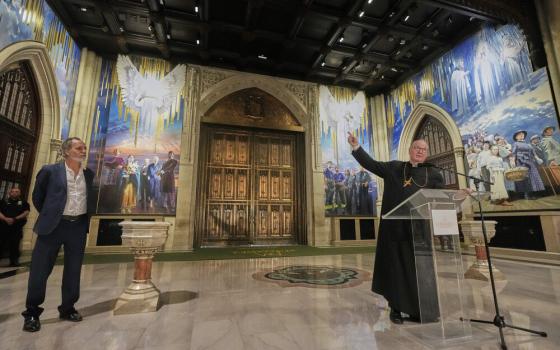
AI-generated image (Pixabay/Enio-ia)
In the marathon of debate and the vote-a-rama before passage of the big Republican budget bill, one vote on the future of regulation of artificial intelligence got scant attention, though it could have had far-reaching consequences.
Hours before a final vote, a provision remained in the legislation that would have wiped away regulation of artificial intelligence. The so-called AI moratorium would have prevented states from reining in this burgeoning new technology that has vast potential for change — and harbors danger for the world, particularly in the absence of federal action..
Thankfully, the U.S. Senate did change this one provision and removed the moratorium on regulating artificial intelligence. Both sides of the aisle eventually agreed — after being forced to vote on the issue — that this Big Tech-friendly idea on AI would lead to the exploitation of children and should be rejected.
The provision backed by Big Tech would have precluded states from passing any laws limiting the harms of AI. That non-budgetary addition would have not only prevented new laws, but dismantled several current state AI laws passed by state legislatures attempting to create common sense safeguards.One coercive version proposed would have even cut off needed broadband Internet and AI infrastructure funding to any state that attempted to protect its citizens, hurting the children in the most rural and poorest states.
Congress has seen this Big Tech muscle flexing show before, and it did not end well.
In 1996, Big Tech made similar pie-in-the-sky promises to Congress as it contemplated a then-new frontier called "the Internet." Instead of accepting common sense guardrails to prevent child exploitation, Big Tech fought the Communications Decency Act, a law intended to protect children from sexual exploitation.
As the Communications Decency Act was on its way to passage, Big Tech persuaded Congress to add into the bill what amounted to a wolf in sheep's clothing: a provision known as Section 230.
Congress intended the provision to incentivize platforms to protect children by providing a very limited "good Samaritan" defense from liability for removing indecent material from its platform. Big Tech claimed that with Section 230's language, companies would do the right thing and make the Internet safe for children. Tech then distorted the language of Section 230, from that intended narrow defense to near complete immunity for the harms they cause. That made them the only industry without federal regulation and precluded states from being able to enforce their own state consumer-protection laws.
The result: Abject failure noted by popes, bishops, the government and parents. The Internet Watch Foundation describes the Internet as "awash" in AI-generated child sexual abuse material. The FBI issued a warning to all Americans about the growth of sextortion targeting minors and young adults. The surgeon general called for warning labels on social media. Parents have reported their children dying from online narcotic sales and algorithms that promote self-harm. Whistleblowers reveal that Big Tech is aware of all these potential effects, but intentionally puts "astronomical profits before people."
Today's AI threat to children is even worse. In 2024, the National Center for Missing and Exploited Children's CyberTipline saw a 1,325% increase in reports involving generative AI. "Nudify" apps cause children and adults to be exploited through fake sexualized images circulated online. The FBI has warned of an explosion of organized criminal sextortion. AI chatbots engage in sexually explicit conversations with children and even encourage them to kill their parents.
In both his inaugural address to the cardinals and his first speech to journalists, Pope Leo XVI outlined the threat of AI and the need for it to develop with human dignity at the center. He recognized its "immense potential, which nevertheless requires responsibility and discernment in order to ensure that it can be used for the good of all. …"
In his Jan. 28 Antiqua et nova: Note on the Relationship Between Artificial Intelligence and Human Intelligence, Pope Francis noted the "specific challenges for the development of children" and called for "careful regulation” of AI, not a moratorium.
The U.S. bishops' conference echoed Pope Francis in a June 9 letter to Congress that also called for regulation "informed by ethical principles and reasonable policy considerations."
These Catholic leaders share the bipartisan concerns of nearly 75% of voters from both parties who favor both state and federal AI regulations. And 40 state attorneys general and 17 Republican governors agree. They viewed this as a non-budgetary power grab by Big Tech hidden in a budget bill.
Advertisement
Just as it appeared history would repeat itself, many senators recognized that Section 230 was a mistake, and Senator Marsha Blackburn, Republican of Tennessee, alluded in her floor speech that Big Tech was again trying to use the same playbook.
By a vote of 99-1, the Senate struck this provision.
The bad news is the fight must continue. AI investors donate significantly to House leadership and this moratorium was leadership's gift to AI donors. The same leadership did Tech's bidding and sunk commonsense Internet child safety legislation, which passed the Senate last year 93-3.
In our divisive nation there is perhaps one issue all agree on: Big Tech is harming our children because they, like no other industry, are largely unregulated thanks to Section 230. As such, they act with impunity and will continue to thwart bipartisan efforts to install reasonable limits to protect children. Congress should be inspired by the vision articulated by bipartisan leaders, as well as popes and bishops, and resist Tech's profit motive in favor of safety.







